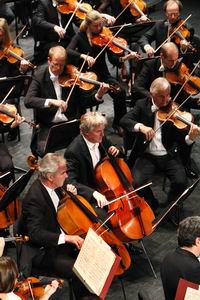
The world-renowned Munich Philharmonic Orchestra, under
the baton of its new music director Christian Thielemann, staged a full-house
concert at Shanghai Concert Hall to a storm of applause and cheers.--Shanghai
Daily
Zhu Moqing/Shanghai Daily news
When musicians play their countryfolks' masterpieces, they "speak" their
mother tongue with great passion. As for a time-honored German orchestra, it is
a passion for the great German musical tradition deeply rooted in Buxtehude,
Bach and Telemann.
This was exactly what the Shanghai audience experienced Tuesday night in a
concert dedicated to German Romanticism by the world-renowned Munich
Philharmonic Orchestra under the baton of its energetic new music director
Christian Thielemann. Staged at the classical Shanghai Concert Hall, it had been
one of the most-anticipated concerts of this year.
Founded in 1893, the Munich Philharmonic has attracted numerous great
conductors and composers. Gustav Mahler first directed the group in 1897 and
premiered his Symphonies No. 4 and No. 8 with the orchestra. Wilhelm Furtwangler
made his conducting debut there in 1906. Through the years the orchestra has
established world-wide fame in performing music in German and Austrian
traditions.
Late Romantic period ardor dominated the first half of the Shanghai
concert with two symphonic poems by Richard Strauss. The opening bars of "Don
Juan, Op. 20," immediately showcased the orchestra's warm yet compact string
section. An unusual seating arrangement, favored by many nowadays, split the two
violin sections to both sides of the conductor, creating an antiphonal effect.
But most impressive is charismatic Thielemann. His gestures were limited but
very clear and full of tension, creating a compelling interpretation of this
famous literary figure in the Romantic period. The brass section reached its
full strength with a luster and smoothness in the latter half of "Don Juan" from
the agitated theme on the horns and in the subsequent "Tod und Verklarung, Op.
24."
Whereas the Shanghai Concert Hall might have too small a stage to accommodate
Strauss' profusely orchestrated works, it proved to be perfect in acoustics for
Johannes Brahms' "Symphony No. 1 in C Minor, Op. 68," which formed the second
half of the concert. The introspection expressed in the symphony, which involved
some 20 years' painstaking work by the great composer, created a sharp contrast
with Strauss.
The thunderous opening of the first movement with bold timpani strokes
instantly conveyed a touch of Germanic profoundness. In the tender passages
immediately prior to the entry of the first theme, Thielemann displayed great
flexibility in tempo and expressive freedom, an interpretative device observed
throughout the performance. The second theme was subtly shaped by the wonderful
woodwind section. The exposition was repeated.
The second movement saw more woodwind passages in full mellowness and
expressiveness. The second theme was sung with heavenly beauty on the oboe and
was repeated later by the concertmaster's solo violin. The third movement,
however, was imbued with a dance-like character.
Thielemann's freedom in expression delayed the entry of the first theme in
the Finale with an unexpected pause and the theme, which budded with a rather
slow tempo, progressed in a thrilling accelerando.
Likewise, the great chorale in the coda was expanded to the extent that the
subsequent passages seemed contrastingly rapid. Although some might argue such a
device was too artificial, one couldn't deny its dramatic effect.
In a storm of applause and cheers, Thielemann generously offered as an encore
Wagner's prelude to "Die Meistersinger von Nurnberg" as he jumped onto the
podium with athletic vitality as if he himself were the Walther in the opera,
ready to top a competition. A signature piece of Thielemann, who started his
career conducting Wagner.
Bravo to both the orchestra and maestro Thielemann.



